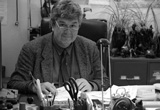 In an article in the Daily Telegraph, Gerry Robinson tells us that “fixing the NHS is straightforward.” He writes with optimistic alacrity of pragmatic, logistical, data-fuelled managerial devices to sharpen purview and performance. He cites management in McDonalds and Phones4U as good role models for healthcare. He conveys this as if it is bold and new.
In an article in the Daily Telegraph, Gerry Robinson tells us that “fixing the NHS is straightforward.” He writes with optimistic alacrity of pragmatic, logistical, data-fuelled managerial devices to sharpen purview and performance. He cites management in McDonalds and Phones4U as good role models for healthcare. He conveys this as if it is bold and new.
I have been a frontline NHS doctor for more than forty years and my view is very different. In the last two decades we have had ever increasing infusions of such management modelling and corporate redesigns, based on what works in commerce and manufacturing industries. The resulting industrialisation of healthcare—and its guidance by the 3Cs: commissioning, competition, and commodification—has led to grievous loss of humane interest, attachments, and vocation in healthcare. The Mid Staffs debacle is one severe and grotesque consequent example.
My own view has become countercultural. It is that healthcare is a humanity guided by science. That humanity is an art and an ethos. These cannot simply be managed or manufactured. They are complex manifestations of education and culture more than any training and obedience. At the heart of this humanity lie the questions of why and how we should care for one another. The best answers come from milieux that can respectfully grow personal attachments, affections, and understandings. The less industrial, older NHS fostered such important subtleties much more readily.
Healthcare is bedevilled by such chimera and complexity. It is dangerous folly to think we can easily short circuit these by some kind of brilliant, quasi-commercial, or military-type plans or charismatic leadership. “Straightforward?” No. “Fixes?” There are none: we can offer only our wisest and most compassionate and dextrous compromises. Mid Staffs is not so much about simple managerial incompetence; it is more about the overgrowth of managerialism and the inadvertent asphyxiation of natural humanity.
The older NHS that mentored me may have been less scientifically efficient and managed, but it was richer in humanity and caring imagination.
David Zigmond is a GP in London.